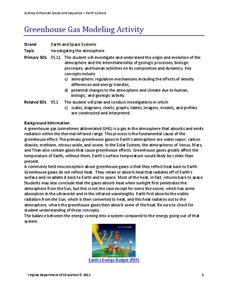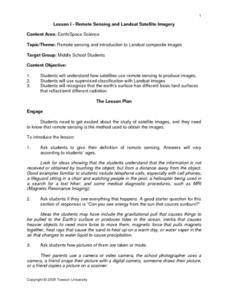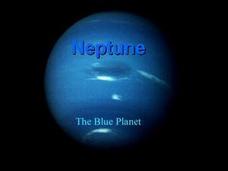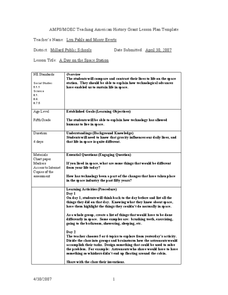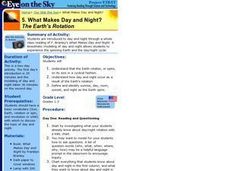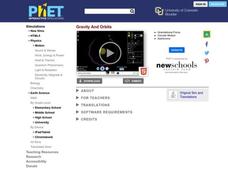Space Awareness
Water is a Heat Sink
One of the key objectives of Europe's Copernicus Earth program is to monitor the temperatures of the oceans and seas on Earth. Young scholars learn the effects of different heat capacities through two experiments. These experiments...
Virginia Department of Education
Greenhouse Gas Modeling Activity
Why are greenhouse gases called greenhouse gases? Young Earth scientists learn about greenhouse gases though experimentation in the second installment of a 3-part series. They use lamps to model radiant energy as well as warming through...
Curated OER
My Angle on Cooling
Students explore how the angle and distance of an object can change it's temperature. After reviewing how the position of the Earth affects the temperature of the planet, student groups design and perform an experiment to test how...
Curated OER
Orbital path of Landsat
Students comprehend how Landsat satellites orbit teh Earth to produce images. They comprehend the elliptical path of satellites. Students recognize that a different orbital path is needed for different satellites to perform their tasks....
Curated OER
Remote Sensing and Landsat Satellite Imagery
Students comprehend how satellites use remote sensing to produce images. They use supervised classification with Landsat images. Students recognize that the earth's surface has different basic land surfaces that reflect/emit different...
NOAA
Ocean Acidification
If tap water is more acidic than ocean water, why are we so concerned about ocean acidification? The third installment of a 23-part NOAA Enrichment in Marine sciences and Oceanography (NEMO) program focuses on carbon dioxide levels in...
Ask a Biologist
It’s a Plankton Eat Plankton World
For as small as they are, plankton sure play an enormous role in maintaining marine ecosystems. Dive into an investigation of these tiny organisms with a hands-on life science activity in which children cut out pictures of sea animals...
Curated OER
Neptune: The Blue Planet
A lovely space science PowerPoint teaches learners about the discovery and characteristics of the planet Neptune. The slides show real photographs, along with clear descriptions about Neptune. This PowerPoint is beautifully done with...
Curated OER
Mercury, Venus, and Earth
Learners learn information about the planets Mercury, Venus, and Earth by playing a trivia game.
Curated OER
Space: Stars and Planets
Students observe and report that the moon can be seen sometimes at night and sometimes during the day. They describe how changes to a model can help predict how the real thing can be altered. Students explain the essential fact of the...
Curated OER
Earth Clock- A Timeline, Past to Present
Young scholars create an earth clock. In this earth clock lesson, students create a clock which serves as a timeline of the history of the earth from 4.567 billion years ago to present day.
Curated OER
Watch This Space!
In this space worksheet, students, with a partner, answer five questions about the universe and read and discuss ten questions regarding astronomy.
Curated OER
Working in Space
Learners design and build one of three engineering problems dealing with living and working in space.
Curated OER
Earth, Sun and Moon
Students investigate that the sun is at the center of the solar system through role play. One student is the sun and one student is the Earth. The students then show how the Earth orbits around the sun. Students view a flashlight and...
Curated OER
Earth and Sun's Distance
Students consider the shape of the Earth's orbit around the Sun. They view the first segment of Science Court video and use Timeliner software to construct a scale of the distance between the Earth and the Sun.
Curated OER
A Day on the Space Station
Fifth graders discover what it would be like to live in space. In this technological advancements lesson, 5th graders discuss how space life would be different from Earth life. Students also identify how technology has made life in space...
Curated OER
Sun-Earth Day Flip Books
Students assemble flip books. In this Earth science lesson, students read about different solar occurrences and create flip books. This teacher resource has links to create six different flip books.
Curated OER
What Makes Day and Night? The Earth's Rotation
Students discover that the Earth rotates on its axis in a cyclical fashion. They examine how this rotation results in day and night.
Curated OER
Our Moon
In this space science activity, students use the clues given at the bottom of the sheet to solve the crossword puzzle on our moon. They name another name for the moon and the moon's gravity compared to that of the earth.
Curated OER
Solar System Hall Model
Not novel, but fun, this activity gets your space science learners to model the size of the planets and the solar system along your school's hallway. Scaled measurements as well as actual distances are provided for both planet diameters...
Curated OER
Our Solar System
In this space science worksheet, students use the clues at the bottom of the sheet to solve the crossword puzzle on our solar system. They identify the different planets and their location in relation to the sun.
Curated OER
Our Sun
In this space science worksheet, learners use the clues at the bottom of the sheet to solve the crossword puzzle on our sun. They identify the cooler and visible surface areas of the sun, as well as what sunspots are on the sun.
PHET
Gravity And Orbits
Have you ever wanted to turn off gravity? This simulation allows learners to do just that in addition to altering other variables. Scholars can move the sun, Earth, moon, and space station to see how distance affects gravitational pull....
Curated OER
Mission to Mars: The Journey Begins
Students take a trip through space. In this space science lesson, students travel on a simulated mission to a space station. Students write a script and perform a play based on the pretend trip.



